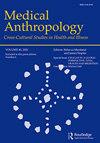Contesting the Reservoir: Guarani-Mbya Criticisms of Zoonosis, Race, and Dirt in the Jaraguá Indigenous Land, Brazil.
IF 1.5
3区 社会学
Q2 ANTHROPOLOGY
引用次数: 0
Abstract
In Brazil, epidemiological understandings of zoonosis have historically articulated with race and class hierarchies, placing so-called non-modern bodies at the core of etiological theories and sanitary interventions. I describe how the Guarani-Mbya people living in the Jaraguá Indigenous Land in the city of São Paulo question the racialized narratives that human-rat contact is a major driver of infections such as leptospirosis. By analyzing Indigenous concepts of body, disease, and dirt, I suggest that the Guarani-Mbya disease ontology reflects a criticism of urbanization, in that it is considered to have pathogenic effects on the lives of Indigenous peoples and rats.
水库之争:瓜拉尼-米亚对雅拉古土著土地人畜共患病、种族和污垢的批评,巴西。
在巴西,对人畜共患病的流行病学理解历来与种族和阶级等级联系在一起,将所谓的非现代身体置于病因学理论和卫生干预措施的核心。我描述了生活在圣保罗市贾拉古土著土地上的瓜拉尼-姆比亚人如何质疑人鼠接触是钩端螺旋体病等感染的主要驱动因素的种族化叙述。通过分析土著对身体、疾病和污垢的概念,我认为瓜拉尼-姆比亚疾病本体论反映了对城市化的批评,因为它被认为对土著人民和老鼠的生活有致病作用。
本文章由计算机程序翻译,如有差异,请以英文原文为准。
求助全文
约1分钟内获得全文
求助全文
来源期刊

Medical Anthropology
Multiple-
CiteScore
4.10
自引率
4.30%
发文量
57
期刊介绍:
Medical Anthropology provides a global forum for scholarly articles on the social patterns of ill-health and disease transmission, and experiences of and knowledge about health, illness and wellbeing. These include the nature, organization and movement of peoples, technologies and treatments, and how inequalities pattern access to these. Articles published in the journal showcase the theoretical sophistication, methodological soundness and ethnographic richness of contemporary medical anthropology. Through the publication of empirical articles and editorials, we encourage our authors and readers to engage critically with the key debates of our time. Medical Anthropology invites manuscripts on a wide range of topics, reflecting the diversity and the expanding interests and concerns of researchers in the field.
 求助内容:
求助内容: 应助结果提醒方式:
应助结果提醒方式:


